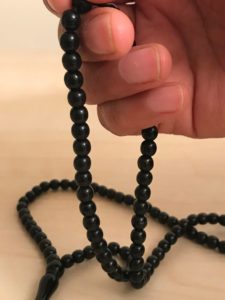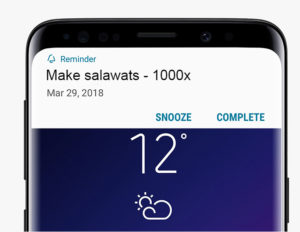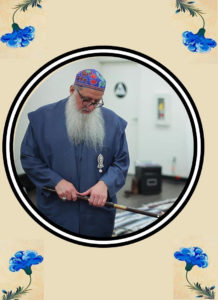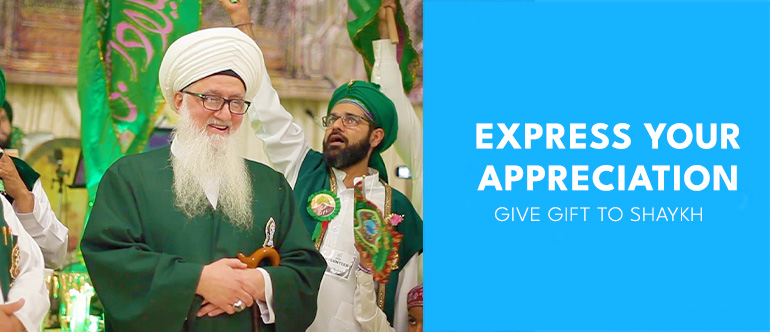
Finding a Spouse in the End Times Q&A
From the Realities of Mawlana (Q) as taught by Shaykh Nurjan Mirahmadi
A’udhu Billahi Minash Shaitanir Rajeem
Bismillahir Rahmanir Raheem
I seek refuge in Allah from Satan, the rejected one
In the Name of Allah, the Most Beneficent, the Most Merciful
Question: As salaam alaykum Sayyidi and SMC staff. After experiencing the life of tariqah (spiritual path), I feel a separation from the physicality. Now I get extremely disturbed from the negative actions of others. How do I deal with the discerning feeling it causes? Almost like I get disgusted. Second, my spouse is a born Muslim but smokes cigarettes, marijuana, speaks vulgar, etc. I’m not trying to expose him or put him down. I only want to ask advice on how to deal with this in the best way. I feel completely out of place in my environment. Is this also normal?
 Shaykh Nurjan Mirahmadi: What was the first question?
Shaykh Nurjan Mirahmadi: What was the first question?
Audience: How do I deal with the discerning feeling?
Shaykh Nurjan Mirahmadi: Yeah, A’udhu Billahi Minash Shaitanir Rajeem Bismillahir Rahmanir Raheem.
When Allah (AJ), when He guides His servant and this is a guidance when a falsehood is lifted and clarity is granted. When this process is beginning, Allah (AJ) is not giving us these abilities, this understanding, this clarity to judge His creation. So, that’s why the whole package of tariqah, I just talked about it, it was to be a qurban (sacrifice). It means sacrifice yourself to be of service.
 So, the shaykhs – they don’t take from the caliber of their understanding and reality. They could not talk to anyone and tolerate anyone because they can smell people. They can smell even comments of people. They can smell the bad character of people. They can see the lights off of people. If it was about not tolerating, they would have all run to like a cave or ocean [noise occurs in background]. See? They can’t tolerate. They would not tolerate. But they learn that Allah (AJ) only opens because He wants them to serve. So, our life is to be of service, is to educate, to build up, to give people hope, to tell them that if you do like this, it would be better. If you do like that, that would be better. So, there’s a whole process.
So, the shaykhs – they don’t take from the caliber of their understanding and reality. They could not talk to anyone and tolerate anyone because they can smell people. They can smell even comments of people. They can smell the bad character of people. They can see the lights off of people. If it was about not tolerating, they would have all run to like a cave or ocean [noise occurs in background]. See? They can’t tolerate. They would not tolerate. But they learn that Allah (AJ) only opens because He wants them to serve. So, our life is to be of service, is to educate, to build up, to give people hope, to tell them that if you do like this, it would be better. If you do like that, that would be better. So, there’s a whole process.
But for one who is starting, is not the time to educate but it’s a time to elevate. So, it means first learn your way, understand your practices, build your energy, build your meditation. Be patient and loving with God’s creation. We’re not here to judge them and to attack them, but to build ourselves. Later when you’re  built and your energy is developed – relationship – then your training has been developed. At that time, you become an ambassador for truth. Now you may open your mouth and fight with everyone and that’s not the purpose of enlightenment.
built and your energy is developed – relationship – then your training has been developed. At that time, you become an ambassador for truth. Now you may open your mouth and fight with everyone and that’s not the purpose of enlightenment.
Enlightenment was to bring light upon a dark earth, not to yell at people and make them go deeper into the darkness. We don’t work for devils but we work for the heavens. Our job is to take people back into heaven, not to fight them so they go back into the hands of devils, inshaAllah.
Question: I have a question for you, Sayyidi. What’s the dangers of confidence? I hear that I have too much confidence. Can confidence break my connection and is it okay to fear your own confidence?
 Shaykh Nurjan Mirahmadi: Yeah, confidence, everything is like a fine line. Confidence and pride are a fine line. You can be confident in your ability, in your love, in your practices but you should also be taking a path of humility. So, somebody, their qira’at (recitation) is good. Their recitation is good. They think their prayers are strong. But then tariqah comes and teaches: in public, hide your salah (prayer).
Shaykh Nurjan Mirahmadi: Yeah, confidence, everything is like a fine line. Confidence and pride are a fine line. You can be confident in your ability, in your love, in your practices but you should also be taking a path of humility. So, somebody, their qira’at (recitation) is good. Their recitation is good. They think their prayers are strong. But then tariqah comes and teaches: in public, hide your salah (prayer).
 So, many times people come and they complain with Naqshbandi salah that, ‘Why you guys pray faster than other people?’ Because the wisdom. The wisdom is what we want to do, we do for Allah (AJ) privately. If you’re one who meditates, contemplates and you love to pray long periods of time, don’t do that in public because this good action will be stolen by your nafs (ego). As soon as you do it, ‘Ah, I bet everyone is watching me. Look, alhamdulillah, they probably think I’m so pious. Alhamdulillah.’ The ego now took your action and it’s no longer for Allah (AJ).
So, many times people come and they complain with Naqshbandi salah that, ‘Why you guys pray faster than other people?’ Because the wisdom. The wisdom is what we want to do, we do for Allah (AJ) privately. If you’re one who meditates, contemplates and you love to pray long periods of time, don’t do that in public because this good action will be stolen by your nafs (ego). As soon as you do it, ‘Ah, I bet everyone is watching me. Look, alhamdulillah, they probably think I’m so pious. Alhamdulillah.’ The ego now took your action and it’s no longer for Allah (AJ).
 So, then they pray moderate, they do their prayers unidentified by anyone and it’s finished. And at home when no one sees, that’s the time in which they pray. They do their zikr (Divine remembrance). They cry on their carpet. So, then in public people think, ‘This one is nothing. I’ve watched them all the time. Doesn’t even look like he knows how to pray correctly.’ Because they come to here and say, ‘You guys don’t know how to pray,’ as if they know how to pray.
So, then they pray moderate, they do their prayers unidentified by anyone and it’s finished. And at home when no one sees, that’s the time in which they pray. They do their zikr (Divine remembrance). They cry on their carpet. So, then in public people think, ‘This one is nothing. I’ve watched them all the time. Doesn’t even look like he knows how to pray correctly.’ Because they come to here and say, ‘You guys don’t know how to pray,’ as if they know how to pray.
 But at home they do the reverse. They come and they pray in front of everybody, so amazing. And at home, they probably missed their salah because there’s no one to watch them. Their ego’s not excited about doing it and they don’t want to do it. You see those same ones at the wudu (ablution) station. When it comes time for Jum’ah wudu, oh my goodness! The wudu became ghusl (shower), the water flowing, ‘Wow!’ Every cup is all over dripping all over faces, hairs, clothes. All the clothes have to be wet to show you, ‘I know how to use water.’
But at home they do the reverse. They come and they pray in front of everybody, so amazing. And at home, they probably missed their salah because there’s no one to watch them. Their ego’s not excited about doing it and they don’t want to do it. You see those same ones at the wudu (ablution) station. When it comes time for Jum’ah wudu, oh my goodness! The wudu became ghusl (shower), the water flowing, ‘Wow!’ Every cup is all over dripping all over faces, hairs, clothes. All the clothes have to be wet to show you, ‘I know how to use water.’
When in public, it should have been like a cup. Sayyidina Ibn-Arabi (as) said, ‘Pray…make wudu like a crazy man.’ Just, ‘Chew chew chew,’ [Shaykh does wudu fast]. Don’t talk to anyone. Cover your head fast. Get out and make. And when you use for istinjah, when you have to wash your privates, wash with water privately. They do everything so that people don’t see them. Zahiri (external understanding), they do everything for people to see them. You want to make a full wash and everything, you do that at home. Go take a shower. That’s why many awliya (saints), their awrads (daily practices) were to shower before each salah.
To be hard upon themselves and there wasn’t showers with hot water. These were showers in mountainous regions where the water was iced water. So, they didn’t shower in front of people to give the appearance. But at home when no one was around, Fajr time, they’re ordered to make a shower for every Fajr. Very hard. To freeze and when you’re nice and warm and want to jump right back into your bed, you’re freezing.
 So no, they’re whose struggle was the opposite and different which now today is ajeeb (strange). When you look at the Sufi mannerisms, people don’t understand it, ‘Why are you people like this?’ Everything was to come against the nafs (ego) and not allow the nafs to take a portion of their good deeds. And the good deed that is done hidden for Allah (AJ) alone will be rewarded by Allah (AJ), inshaAllah. The deed that is seen by people will be rewarded by the people, ‘Let me give you a better job as imam (religious leader) or something.’
So no, they’re whose struggle was the opposite and different which now today is ajeeb (strange). When you look at the Sufi mannerisms, people don’t understand it, ‘Why are you people like this?’ Everything was to come against the nafs (ego) and not allow the nafs to take a portion of their good deeds. And the good deed that is done hidden for Allah (AJ) alone will be rewarded by Allah (AJ), inshaAllah. The deed that is seen by people will be rewarded by the people, ‘Let me give you a better job as imam (religious leader) or something.’
Question: As salaam alaykum Sayyidi, we have seen pictures of holy maqam (station) of Rauza Sharif and the holy grill. What is the better adab (manners) to visualize ourselves in front of?
 Shaykh Nurjan Mirahmadi: Wherever you can. Just visualize the Rauza Sharif (Holy burial chamber), the grill – just you’re holding on to the grill and asking Sayyidina Muhammad’s ﷺ holy nazar to be upon us. That I’m just coming here. I don’t need to see anything. I’m just visualizing this maqam (station) Sayyidi Ya Rasulul Karim (The Most Generous Prophet). I’m not worthy of looking at anything. I’m just here. That dress me, bless me, have pity upon me. And build that love in that relationship with the
Shaykh Nurjan Mirahmadi: Wherever you can. Just visualize the Rauza Sharif (Holy burial chamber), the grill – just you’re holding on to the grill and asking Sayyidina Muhammad’s ﷺ holy nazar to be upon us. That I’m just coming here. I don’t need to see anything. I’m just visualizing this maqam (station) Sayyidi Ya Rasulul Karim (The Most Generous Prophet). I’m not worthy of looking at anything. I’m just here. That dress me, bless me, have pity upon me. And build that love in that relationship with the  presence of Sayyidina Muhammad ﷺ, never expecting anything. Don’t keep saying, ‘I want to see. I want to see. I want to see.’ Don’t put an expectation and come through the door with humility, inshaAllah. That, ‘I’m not anyone worthy of seeing. I’m nothing, I’m nothing. Dress me and bless me from your lights.’ They like the approach of humility and Prophet ﷺ is hearing everything.
presence of Sayyidina Muhammad ﷺ, never expecting anything. Don’t keep saying, ‘I want to see. I want to see. I want to see.’ Don’t put an expectation and come through the door with humility, inshaAllah. That, ‘I’m not anyone worthy of seeing. I’m nothing, I’m nothing. Dress me and bless me from your lights.’ They like the approach of humility and Prophet ﷺ is hearing everything.
Question: As salaam alaykum Sayyidi, I would like to ask our Sayyidi if there is a spiritual wisdom and remedies for someone who is having difficulties to find a partner for marriage?
 Shaykh Nurjan Mirahmadi: Yeah, very difficult time. There is a difficulty Salawatul Fatiha reciting as many times as you can, at least seven times a day for an opening from the presence of Sayyidina Muhammad ﷺ. And must take from the ocean that’s closest to you. If you know the masjid in the area and they’re good sort of Ahle Sunnah masjid and you think they’re pro-tariqah people, then ask from the community leaders who know all the different families, that they’re looking and interested in a spouse and they have to take from that ocean. Other ethnic backgrounds, they require to go through their families. And their families are very sort of locked on that understanding. And you don’t want to create any type of conflict, ‘Oh, I want to ask somebody else.’ You go through your family.
Shaykh Nurjan Mirahmadi: Yeah, very difficult time. There is a difficulty Salawatul Fatiha reciting as many times as you can, at least seven times a day for an opening from the presence of Sayyidina Muhammad ﷺ. And must take from the ocean that’s closest to you. If you know the masjid in the area and they’re good sort of Ahle Sunnah masjid and you think they’re pro-tariqah people, then ask from the community leaders who know all the different families, that they’re looking and interested in a spouse and they have to take from that ocean. Other ethnic backgrounds, they require to go through their families. And their families are very sort of locked on that understanding. And you don’t want to create any type of conflict, ‘Oh, I want to ask somebody else.’ You go through your family.
 But now it’s even more difficult time because the majority of people are running after dunya (material world). So there are very few people now interested in getting married because they just want to have fun and play in dunya. And that’s the danger and that’s the difficulty of the times we live in. And that’s why many of the hadith of last days described that type of difficulty. Why? Because these people are all just wanting to play. If they have a little bit of money, they just want to go out and play and entertain themselves. So, we pray that Allah (AJ) open something and just people who are in need of a spouse, that Allah (AJ) dress them with an ability that that opening come to them, inshaAllah.
But now it’s even more difficult time because the majority of people are running after dunya (material world). So there are very few people now interested in getting married because they just want to have fun and play in dunya. And that’s the danger and that’s the difficulty of the times we live in. And that’s why many of the hadith of last days described that type of difficulty. Why? Because these people are all just wanting to play. If they have a little bit of money, they just want to go out and play and entertain themselves. So, we pray that Allah (AJ) open something and just people who are in need of a spouse, that Allah (AJ) dress them with an ability that that opening come to them, inshaAllah.
Question: As salaam alaykum wa rahmatullahi wa barakatuh, Eid mubarak! Sayyidi, I missed my daily awrad (daily practices) a couple of times and feel bad. What should I do, Sayyidi? I even miss doing the basic parts of it and I am so backwards. Help me, ya Sayyidi, madad (support) ya Sayyidi. Forgive me for being ignorant and please pray for me to be steadfast and have good character please.
 Shaykh Nurjan Mirahmadi: Ameen, ameen. Allah (AJ) bless you and all those who are watching and all those who are present with us and forgive me. It’s no problem. You forgot it, you forgot it. The past is the past. It’s only the future that is important. But we said before that the awrad and our practices are time management.
Shaykh Nurjan Mirahmadi: Ameen, ameen. Allah (AJ) bless you and all those who are watching and all those who are present with us and forgive me. It’s no problem. You forgot it, you forgot it. The past is the past. It’s only the future that is important. But we said before that the awrad and our practices are time management.
So just like work and you don’t miss work, you don’t miss showing up on time, you don’t miss projects, you don’t miss homework. All of our life, we were trained in time discipline. So, this is the most important time discipline. You can even get an app for time disciplining. So then, ‘I’m going to do this part of my awrad at my Fajr. Or right when I’m about to go for my work, I pray my Fajr and then do my awrad.’
 I’ll do the zikrs (Divine remembrance), the ‘Allah,’ the salawats (praises upon Prophet Muhammad ﷺ). I’ll do salawats going on the way to work, I’ll do the zikr of ‘Allah’ coming on the way back. So, you can break the awrad up into different sections. The zikr of the awrad, it can be broken up. The beginning part of the awrad, the recitations all the way up to the ihda (dedication) takes nothing more than 10, 15, 20 minutes depending upon if you’ve memorized the Qur’an or not. Suratul Nas, Suratul Falaq, Suratul Ikhlas, that doesn’t take time. But the zikr of Allah (AJ), ‘Allah, Allah, Allah, Allah,’ 1,500 times, you say, ‘Okay, I’ll do going on the way to work.’
I’ll do the zikrs (Divine remembrance), the ‘Allah,’ the salawats (praises upon Prophet Muhammad ﷺ). I’ll do salawats going on the way to work, I’ll do the zikr of ‘Allah’ coming on the way back. So, you can break the awrad up into different sections. The zikr of the awrad, it can be broken up. The beginning part of the awrad, the recitations all the way up to the ihda (dedication) takes nothing more than 10, 15, 20 minutes depending upon if you’ve memorized the Qur’an or not. Suratul Nas, Suratul Falaq, Suratul Ikhlas, that doesn’t take time. But the zikr of Allah (AJ), ‘Allah, Allah, Allah, Allah,’ 1,500 times, you say, ‘Okay, I’ll do going on the way to work.’
The salawat minimum 300 to 500, ‘I’m going to do on the way coming back from work.’ You make a discipline. There’s apps even now and you stick to it. But if you don’t have that discipline and all of a sudden every night at 11:00 is when you’re going to do your awrad, then no. You probably fall asleep – miss it, miss it and then that’s all that shaitan (satan) wants. So, it’s a matter of time management, inshaAllah.
 And there’s apps that can help you now. They set up a reminder – even your iPhone can do it – with a reminder that it says that ‘Make salawats.’ And then put reminder when – three in the afternoon – daily and your phone pops up ‘Make salawats,’ and that you know, you remember. ‘Okay, now I have to do my 1,000 or 500 salawats at that time.’ Do the minimum of the awrad so that you’re minimum connected to these shaykhs all the time. Then you have extra time, go up, you know 10,000 ‘Allah’, 10,000 salawats. When you’re sitting with your family, that’s okay. But do the minimum awrad so that it’s completed everyday, inshaAllah.
And there’s apps that can help you now. They set up a reminder – even your iPhone can do it – with a reminder that it says that ‘Make salawats.’ And then put reminder when – three in the afternoon – daily and your phone pops up ‘Make salawats,’ and that you know, you remember. ‘Okay, now I have to do my 1,000 or 500 salawats at that time.’ Do the minimum of the awrad so that you’re minimum connected to these shaykhs all the time. Then you have extra time, go up, you know 10,000 ‘Allah’, 10,000 salawats. When you’re sitting with your family, that’s okay. But do the minimum awrad so that it’s completed everyday, inshaAllah.
Question: As salaam alaykum Sayyidi, what is Mount Qaaf and why is so significant with Imam Mahdi (as)?
 Shaykh Nurjan Mirahmadi: Alhamdulillah, no permission to talk on that. We gave you a clue already – Jabal Qaaf and the haq (truth) and that reality of where their souls are located. And from that ocean, their souls are being dressed and blessed and moving towards this dunya. They are not sustained from dunya. That their soul is in an area being dressed
Shaykh Nurjan Mirahmadi: Alhamdulillah, no permission to talk on that. We gave you a clue already – Jabal Qaaf and the haq (truth) and that reality of where their souls are located. And from that ocean, their souls are being dressed and blessed and moving towards this dunya. They are not sustained from dunya. That their soul is in an area being dressed  and blessed by the heart of Sayyidina Muhammad ﷺ. These are the people of haq. These are the imams of haq. They’re coming and dressed and blessed from that reality and moving towards this Earth for their zuhoor and their appearance to appear, but has a tremendous reality with the heart of Sayyidina Muhammad ﷺ, inshaAllah.
and blessed by the heart of Sayyidina Muhammad ﷺ. These are the people of haq. These are the imams of haq. They’re coming and dressed and blessed from that reality and moving towards this Earth for their zuhoor and their appearance to appear, but has a tremendous reality with the heart of Sayyidina Muhammad ﷺ, inshaAllah.
Question: Sayyidi, this is from a brother who hasn’t taken a shahada yet. He’s asking, “Hi staff, my salah is incomplete, most English, three quarters. Should I wait to take my shahada on account of this? May Allah (AJ) protect and bless us in this life and the next.”
 Shaykh Nurjan Mirahmadi: Yeah, alhamdulillah, you just say right now with me, “Ashhadu an la ilaha illAllah, Wa ashhadu anna Muhammadan ‘abduhu wa Rasuluh. Ashhadu an la ilaha illAllah, Wa ashhadu anna Muhammadan ‘abduhu wa Rasuluh. Ashhadu an la ilaha illAllah, Wa ashhadu anna Muhammadan ‘abduhu wa Rasuluh.”
Shaykh Nurjan Mirahmadi: Yeah, alhamdulillah, you just say right now with me, “Ashhadu an la ilaha illAllah, Wa ashhadu anna Muhammadan ‘abduhu wa Rasuluh. Ashhadu an la ilaha illAllah, Wa ashhadu anna Muhammadan ‘abduhu wa Rasuluh. Ashhadu an la ilaha illAllah, Wa ashhadu anna Muhammadan ‘abduhu wa Rasuluh.”
أَشْهَدُ أَنْ لَا إِلَهَ إلاَّ الله وَأَشْهَدُ أَنَّ مُحَمَّدًاعَبْدُهُ وَرَسُولُهُ
“Ashhadu an la ilaha illAllah, Wa ashhadu anna Muhammadan ‘abduhu wa Rasuluh.”
“I bear witness that there is no god but Allah and Muhammad is His servant and Messenger.”
 “A’udhu Billahi Minash Shaitanir Rajeem Bismillahir Rahmanir Raheem. Innal ladheena yubayi’oonaka innama yubayi’on Allaha yadullahi fawqa aydeehim, faman nakatha fa innama yankuthu ‘ala nafsihi, wa man awfa bima ‘ahada ‘alayhu Allaha fasayu teehi ajran ‘azheema.”
“A’udhu Billahi Minash Shaitanir Rajeem Bismillahir Rahmanir Raheem. Innal ladheena yubayi’oonaka innama yubayi’on Allaha yadullahi fawqa aydeehim, faman nakatha fa innama yankuthu ‘ala nafsihi, wa man awfa bima ‘ahada ‘alayhu Allaha fasayu teehi ajran ‘azheema.”
﴾إِنَّ الَّذِينَ يُبَايِعُونَكَ إِنَّمَا يُبَايِعُونَ اللَّـهَ يَدُ اللَّـهِ فَوْقَ أَيْدِيهِمْ ۚ فَمَن نَّكَثَ فَإِنَّمَا يَنكُثُ عَلَىٰ نَفْسِهِ ۖ وَمَنْ أَوْفَىٰ بِمَا عَاهَدَ عَلَيْهُ اللَّـهَ فَسَيُؤْتِيهِ أَجْرًا عَظِيمًا ﴿١٠
48:10 – “Innal ladheena yubayi’oonaka innama yubayi’on Allaha yadullahi fawqa aydeehim, faman nakatha fa innama yankuthu ‘ala nafsihi, wa man awfa bima ‘ahada ‘alayhu Allaha fasayu teehi ajran ‘azheema.” (Surat Al-Fath)
“Indeed, those who give Bayah (pledge allegiance) to you, [O Muhammad] – they are actually giving Bayah (pledge allegiance) to Allah. The hand of Allah is over their hands. So, he whoever breaks his pledge/oath, only breaks it to the detriment/Harm/loss of himself. And whoever fulfills their covenant (Bayah) that which he has promised Allah (AJ) – He will grant him a great reward.” (The Victory, 48:10)
[Mawlana Shaykh recites the Bay’ah – Pledge of Allegiance to the Naqshbandi Way]

 Alhamdulillah, everything Mawlana Shaykh (Q) describes is, ‘Go at a slow pace.’ You can print out the salah in Romanised Arabic and you take that in your hand, stand up and you say, “Alhamdulillahi rabbil alameen, Ar Rahmanir Raheem,” and then ruku’ (bowing). Then you go ruku, come back up so you can read along with your salah. If that’s too much for you, then at least make a sujood (prostration) once a day, twice a day, three times a day. Then build it up to four times a day, five times a day just going into prostration and saying, “Bismillahir Rahmanir Raheem.” Whatever you think you can do and progress at a speed that is moderate and easy for you, there’s no rush. Allah (AJ) is not going anywhere. You’ve given your shahada (testimony of faith) so alhamdulillah, you are Muslim and you are Naqshbandi. Allah (AJ) bless you and dress you and forgive me.
Alhamdulillah, everything Mawlana Shaykh (Q) describes is, ‘Go at a slow pace.’ You can print out the salah in Romanised Arabic and you take that in your hand, stand up and you say, “Alhamdulillahi rabbil alameen, Ar Rahmanir Raheem,” and then ruku’ (bowing). Then you go ruku, come back up so you can read along with your salah. If that’s too much for you, then at least make a sujood (prostration) once a day, twice a day, three times a day. Then build it up to four times a day, five times a day just going into prostration and saying, “Bismillahir Rahmanir Raheem.” Whatever you think you can do and progress at a speed that is moderate and easy for you, there’s no rush. Allah (AJ) is not going anywhere. You’ve given your shahada (testimony of faith) so alhamdulillah, you are Muslim and you are Naqshbandi. Allah (AJ) bless you and dress you and forgive me.
Subhana rabbika rabbal ‘izzati ‘amma yasifoon, wa salaamun ‘alal mursaleen, walhamdulillahi rabbil ‘aalameen. Bi hurmati Muhammad al-Mustafa wa bi siri Surat al-Fatiha.
Special thanks to our transcribers for their help with transcribing this suhbah.
Original Date of Suhbah: August 1, 2020
Related Articles:
- Naqshbandi Daily Awrad (Practice)
- Wi-Fi and Realities of the Awrad
- Muraqabah (Islamic Meditation), Opening the Heart: Love, Presence, Fana
- COVID-19 Big Global Reset – Imam Mahdi (as) vs Dajjal
- Signs of Imam Mahdi’s Appearance, Hazrat Isa (as) and End Times
- Sufi Wisdom For Inner Peace Meditation Q&A
Please Donate and support us to spread these heavenly knowledges.
Copyright © 2020 Naqshbandi Islamic Center of Vancouver, All Rights Reserved.














![Private: [ID: Y1isNX3x2sc] Youtube Automatic](https://nurmuhammad.com/wp-content/uploads/private-id-y1isnx3x2sc-youtube-a-236x133.jpg)